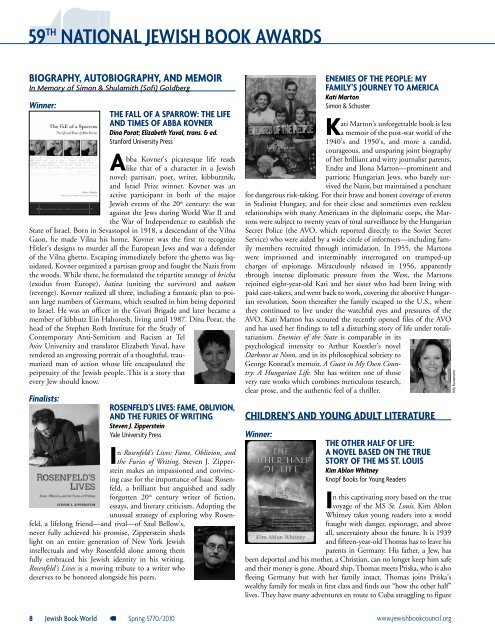reviews - Jewish Book Council
reviews - Jewish Book Council
reviews - Jewish Book Council
Create successful ePaper yourself
Turn your PDF publications into a flip-book with our unique Google optimized e-Paper software.
59 TH NATIONAL JEWISH BOOK AWARDS<br />
BIOGRAPHY, AUTOBIOGRAPHY, AND MEMOIR<br />
In Memory of Simon & Shulamith (Sofi) Goldberg<br />
Winner:<br />
THE FALL OF A SPARROW: THE LIFE<br />
AND TIMES OF ABBA KOVNER<br />
Dina Porat; Elizabeth Yuval, trans. & ed.<br />
Stanford University Press<br />
Abba Kovner’s picaresque life reads<br />
like that of a character in a <strong>Jewish</strong><br />
novel: partisan, poet, writer, kibbutznik,<br />
and Israel Prize winner. Kovner was an<br />
active participant in both of the major<br />
<strong>Jewish</strong> events of the 20th century: the war<br />
against the Jews during World War II and<br />
the War of Independence to establish the<br />
State of Israel. Born in Sevastopol in 1918, a descendant of the Vilna<br />
Gaon, he made Vilna his home. Kovner was the first to recognize<br />
Hitler’s designs to murder all the European Jews and was a defender<br />
of the Vilna ghetto. Escaping immediately before the ghetto was liquidated,<br />
Kovner organized a partisan group and fought the Nazis from<br />
the woods. While there, he formulated the tripartite strategy of bricha<br />
(exodus from Europe), hativa (uniting the survivors) and nakam<br />
(revenge). Kovner realized all three, including a fantastic plan to poison<br />
large numbers of Germans, which resulted in him being deported<br />
to Israel. He was an officer in the Givati Brigade and later became a<br />
member of kibbutz Ein Hahoresh, living until 1987. Dina Porat, the<br />
head of the Stephen Roth Institute for the Study of<br />
Contemporary Anti-Semitism and Racism at Tel<br />
Aviv University and translator Elizabeth Yuval, have<br />
rendered an engrossing portrait of a thoughtful, traumatized<br />
man of action whose life encapsulated the<br />
perpetuity of the <strong>Jewish</strong> people. This is a story that<br />
every Jew should know.<br />
Finalists:<br />
ROSENFELD’S LIVES: FAME, OBLIVION,<br />
AND THE FURIES OF WRITING<br />
Steven J. Zipperstein<br />
Yale University Press<br />
In Rosenfeld’s Lives: Fame, Oblivion, and<br />
the Furies of Writing, Steven J. Zipperstein<br />
makes an impassioned and convincing<br />
case for the importance of Isaac Rosenfeld,<br />
a brilliant but anguished and sadly<br />
forgotten 20th century writer of fiction,<br />
essays, and literary criticism. Adopting the<br />
unusual strategy of exploring why Rosenfeld,<br />
a lifelong friend—and rival—of Saul Bellow’s,<br />
never fully achieved his promise, Zipperstein sheds<br />
light on an entire generation of New York <strong>Jewish</strong><br />
intellectuals and why Rosenfeld alone among them<br />
fully embraced his <strong>Jewish</strong> identity in his writing.<br />
Rosenfeld’s Lives is a moving tribute to a writer who<br />
deserves to be honored alongside his peers.<br />
8 <strong>Jewish</strong> <strong>Book</strong> World Spring 5770/2010<br />
ENEMIES OF THE PEOPLE: MY<br />
FAMILY’S JOURNEY TO AMERICA<br />
Kati Marton<br />
Simon & Schuster<br />
Kati Marton’s unforgettable book is less<br />
a memoir of the post-war world of the<br />
1940’s and 1950’s, and more a candid,<br />
courageous, and unsparing joint biography<br />
of her brilliant and witty journalist parents,<br />
Endre and Ilona Marton—prominent and<br />
patriotic Hungarian Jews, who barely survived<br />
the Nazis, but maintained a penchant<br />
for dangerous risk-taking. For their brave and honest coverage of events<br />
in Stalinist Hungary, and for their close and sometimes even reckless<br />
relationships with many Americans in the diplomatic corps, the Martons<br />
were subject to twenty years of total surveillance by the Hungarian<br />
Secret Police (the AVO, which reported directly to the Soviet Secret<br />
Service) who were aided by a wide circle of informers—including family<br />
members recruited through intimidation. In 1955, the Martons<br />
were imprisoned and interminably interrogated on trumped-up<br />
charges of espionage. Miraculously released in 1956, apparently<br />
through intense diplomatic pressure from the West, the Martons<br />
rejoined eight-year-old Kati and her sister who had been living with<br />
paid care-takers, and went back to work, covering the abortive Hungarian<br />
revolution. Soon thereafter the family escaped to the U.S., where<br />
they continued to live under the watchful eyes and pressures of the<br />
AVO. Kati Marton has scoured the recently opened files of the AVO<br />
and has used her findings to tell a disturbing story of life under totalitarianism.<br />
Enemies of the State is comparable in its<br />
psychological intensity to Arthur Koestler’s novel<br />
Darkness at Noon, and in its philosophical sobriety to<br />
George Konrad’s memoir, A Guest in My Own Country:<br />
A Hungarian Life. She has written one of those<br />
very rare works which combines meticulous research,<br />
clear prose, and the authentic feel of a thriller.<br />
CHILDREN’S AND YOUNG ADULT LITERATURE<br />
Winner:<br />
THE OTHER HALF OF LIFE:<br />
A NOVEL BASED ON THE TRUE<br />
STORY OF THE MS ST. LOUIS<br />
Kim Ablon Whitney<br />
Knopf <strong>Book</strong>s for Young Readers<br />
In this captivating story based on the true<br />
voyage of the MS St. Louis, Kim Ablon<br />
Whitney takes young readers into a world<br />
fraught with danger, espionage, and above<br />
all, uncertainty about the future. It is 1939<br />
and fifteen-year-old Thomas has to leave his<br />
parents in Germany. His father, a Jew, has<br />
been deported and his mother, a Christian, can no longer keep him safe<br />
and their money is gone. Aboard ship, Thomas meets Priska, who is also<br />
fleeing Germany but with her family intact. Thomas joins Priska’s<br />
wealthy family for meals in first class and finds out “how the other half”<br />
lives. They have many adventures en route to Cuba struggling to figure<br />
www.jewishbookcouncil.org<br />
Billy Bustamante


